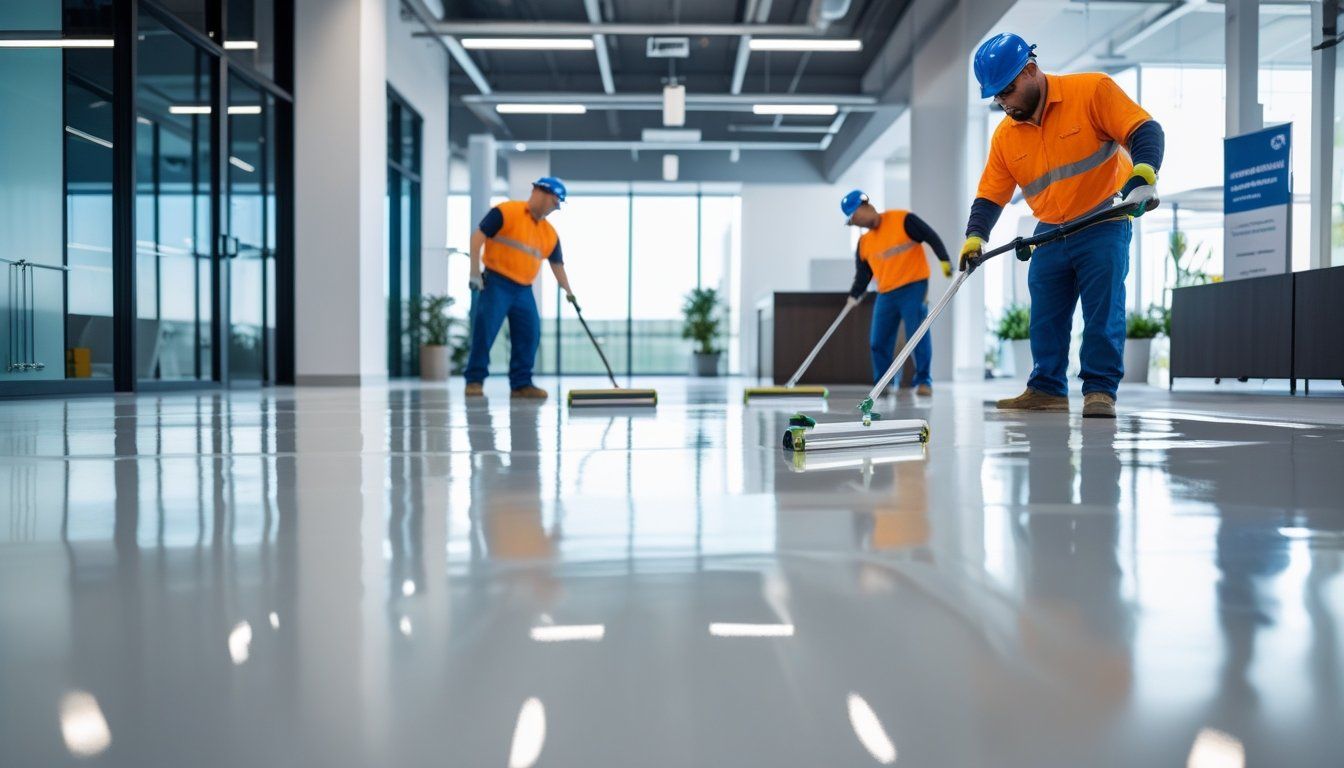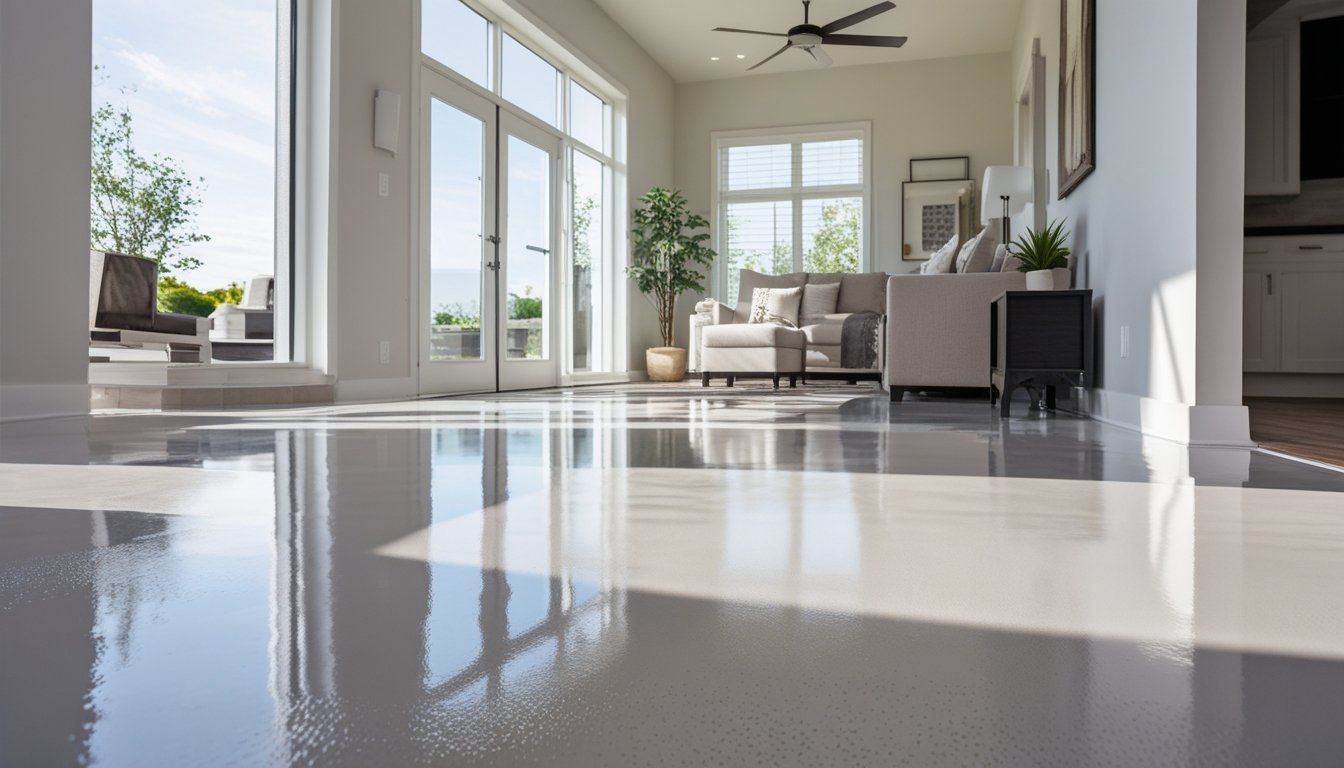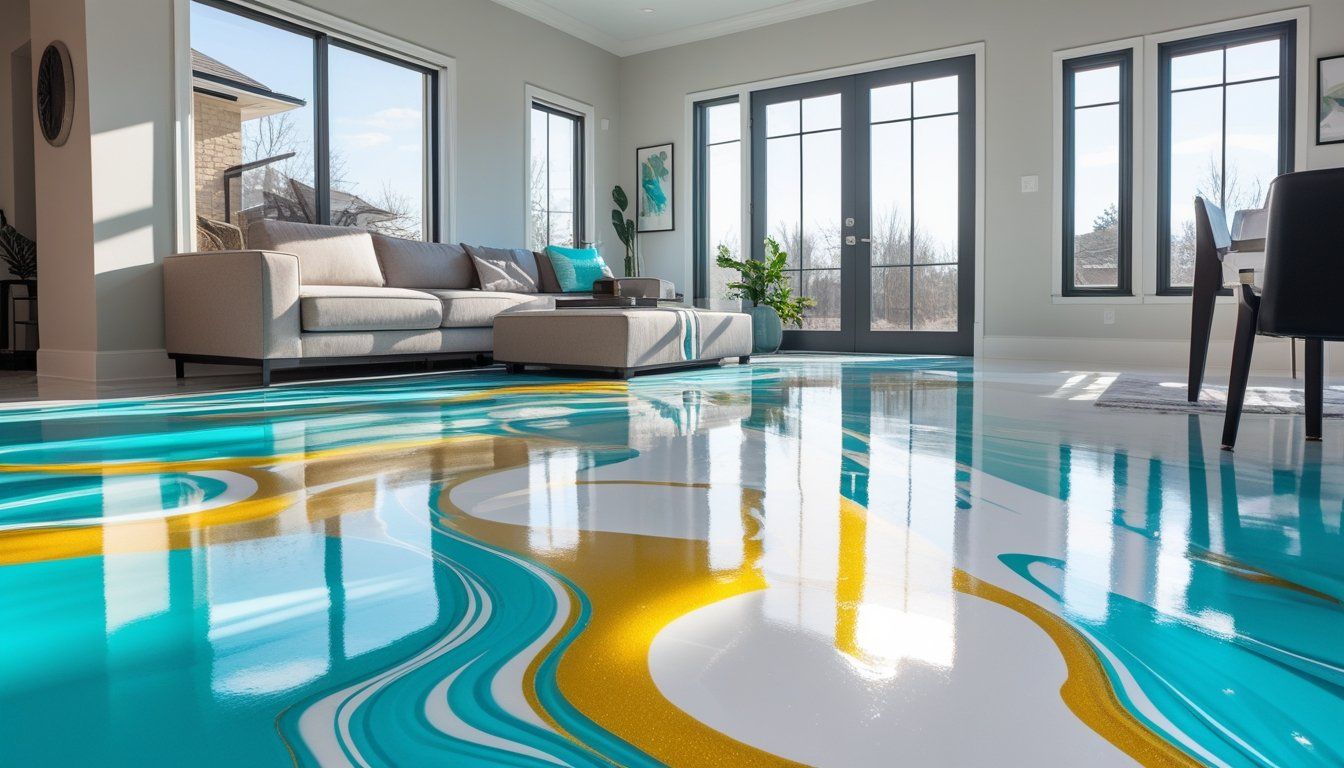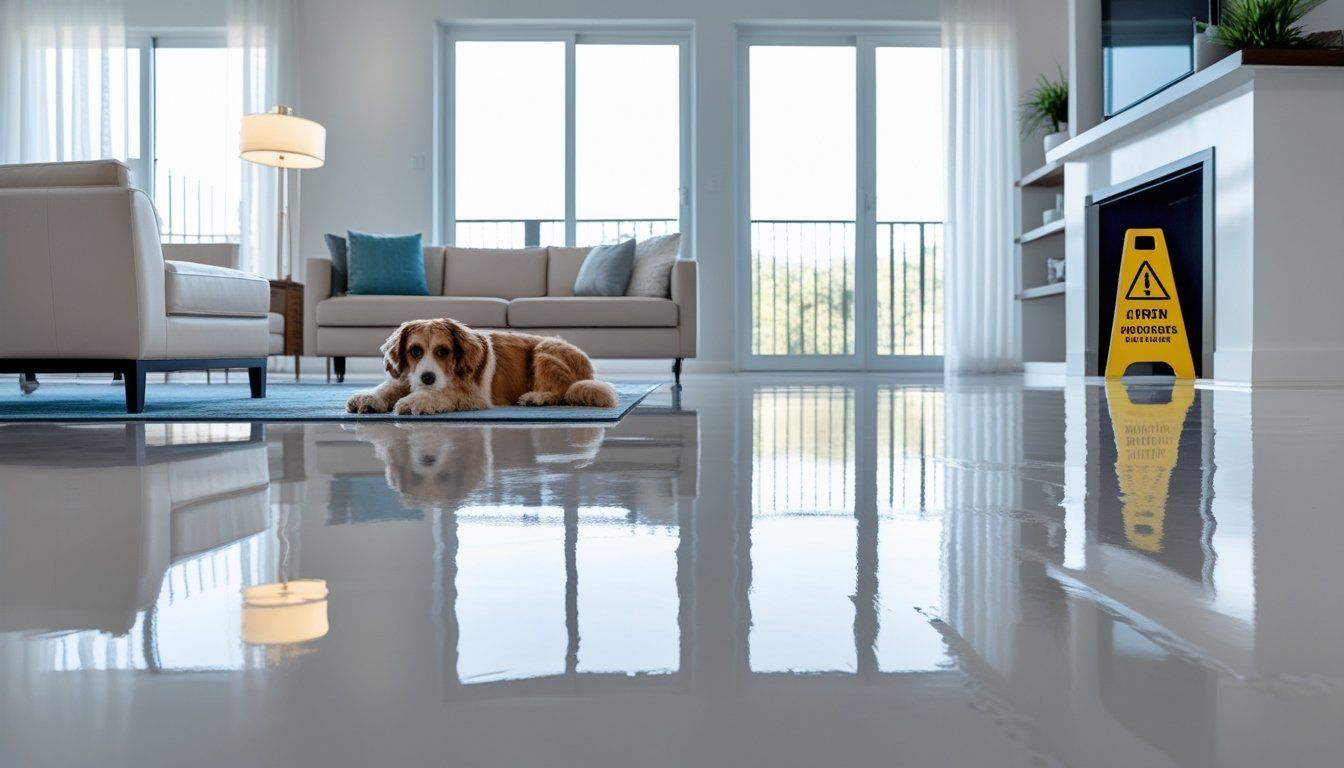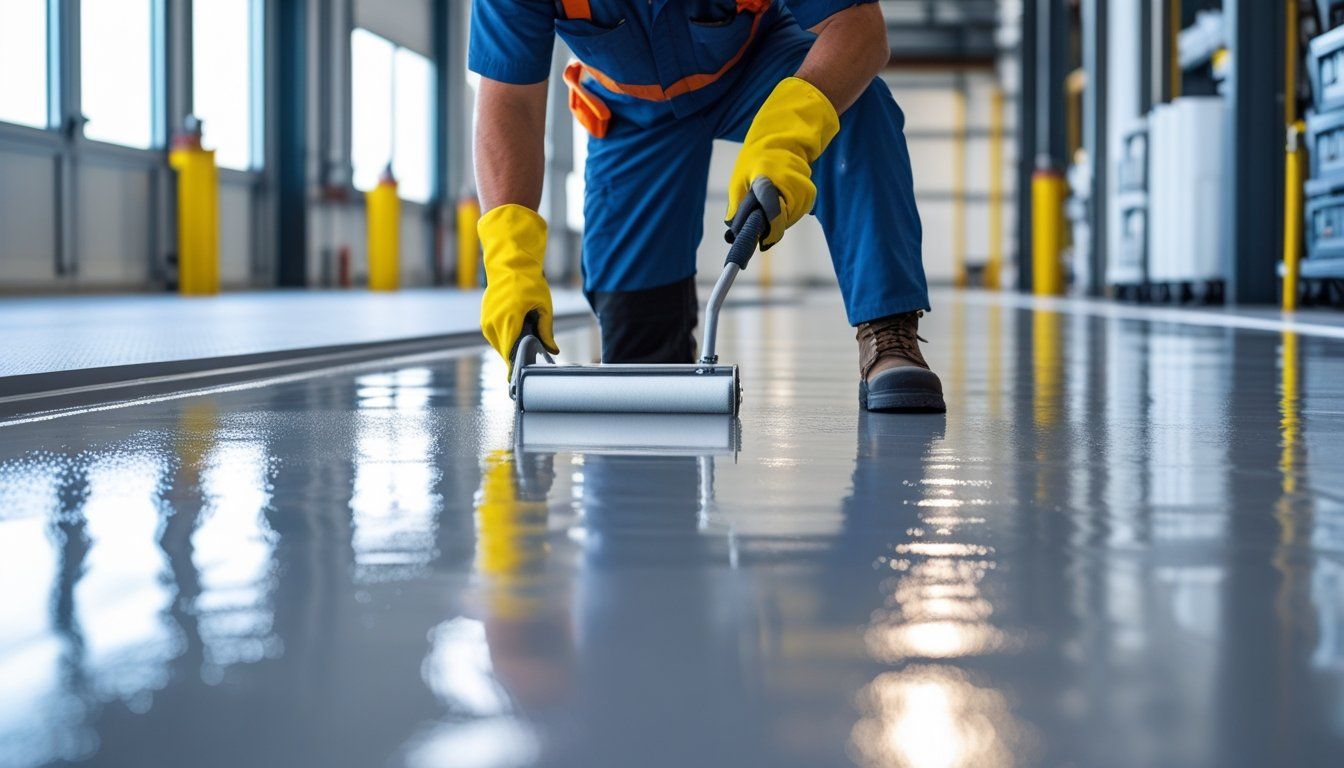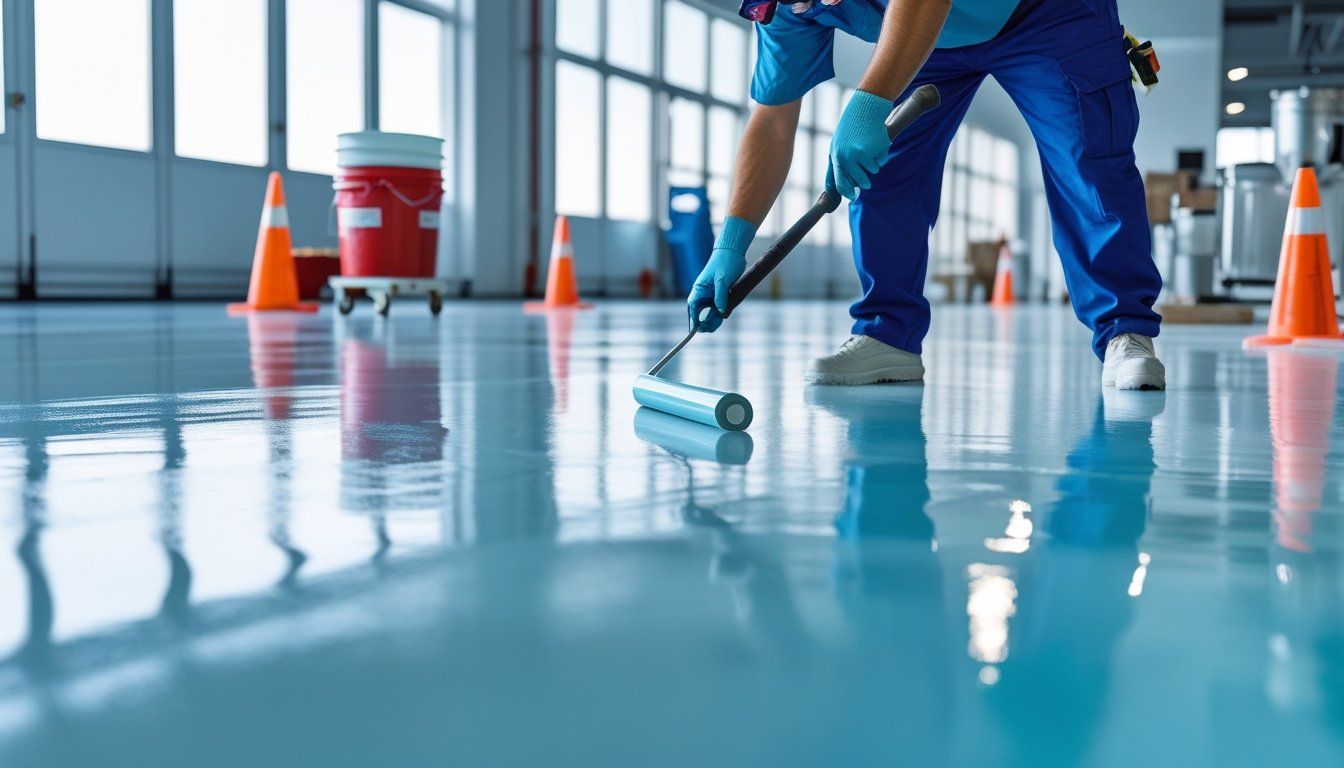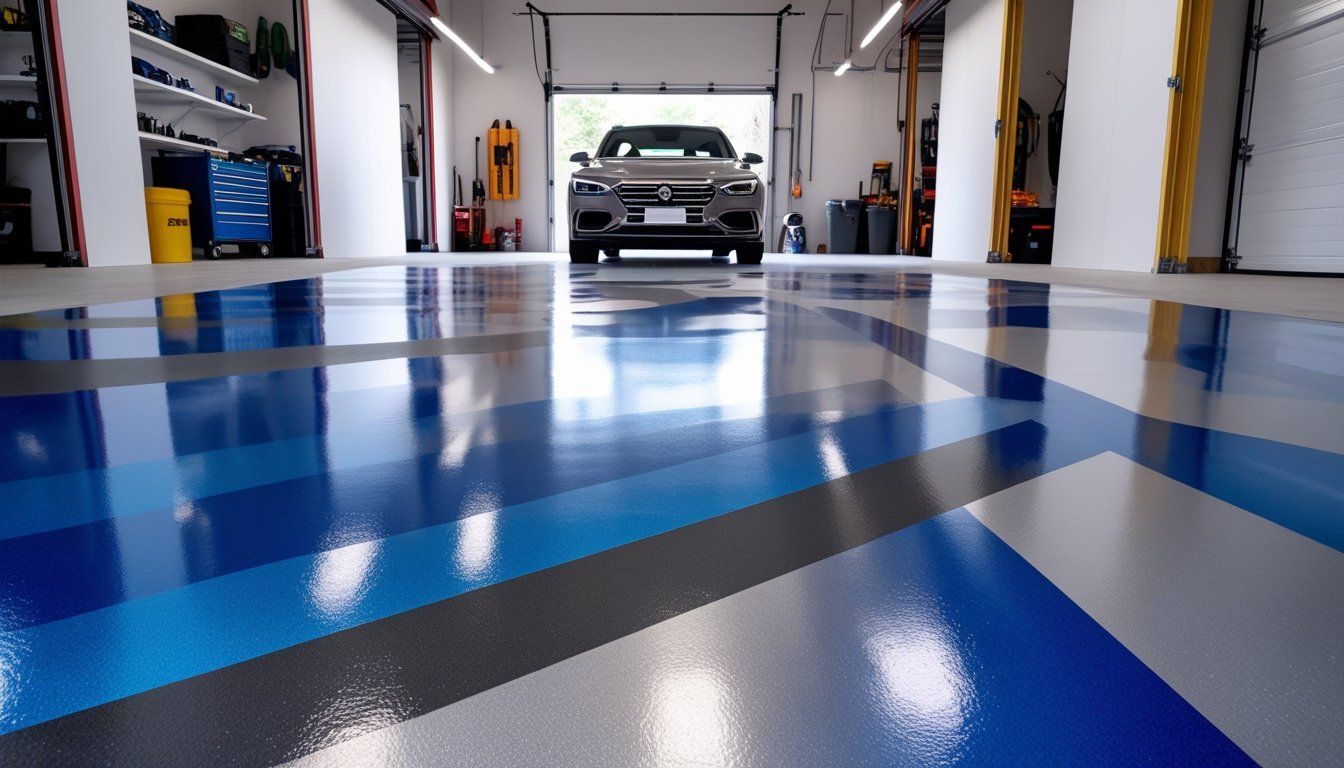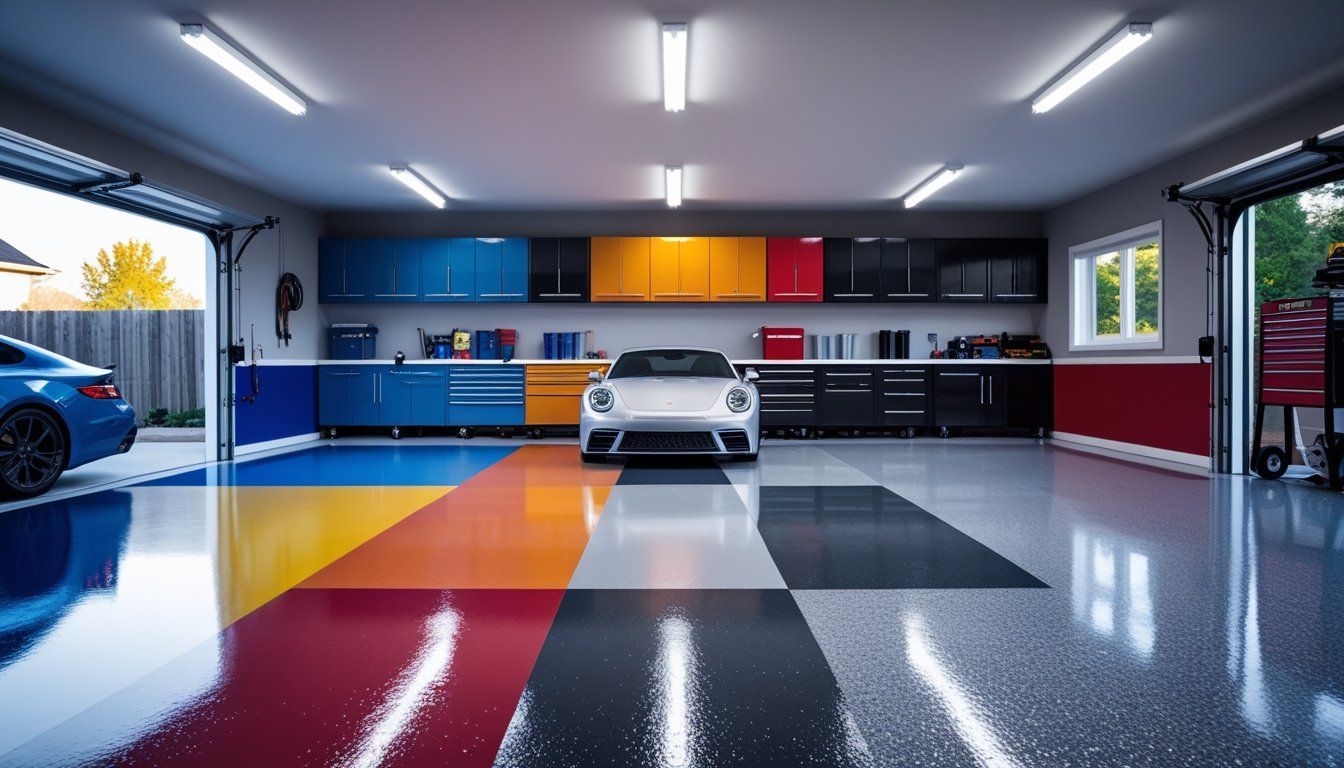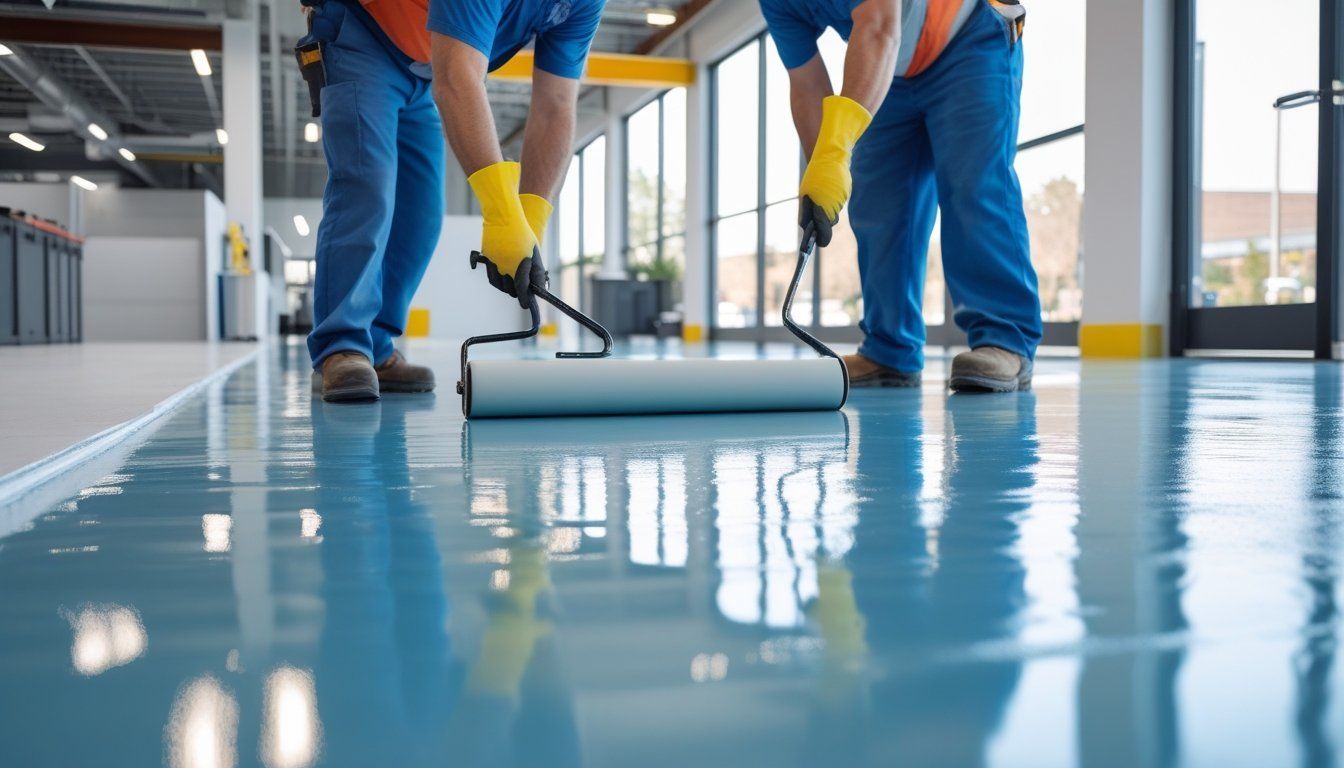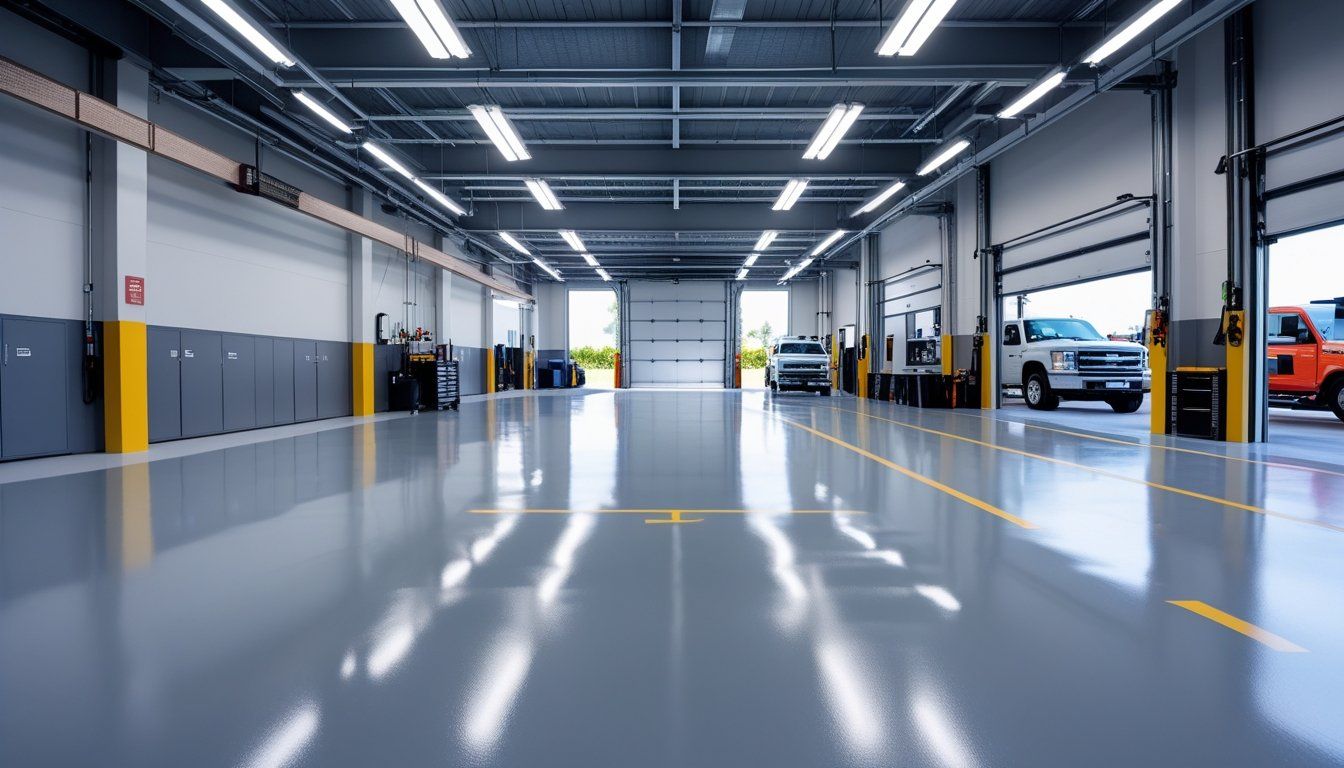Epoxy On Flooring Made Easy: Tips for a Durable Finish
Daniel McGonagle • October 17, 2025
Epoxy flooring is one of the best ways to make any surface tougher, cleaner, and more attractive. It provides a seamless layer that protects against stains, wear, and heavy traffic while staying easy to maintain.
At Cambridge MA Epoxy Flooring, we help homeowners
and business owners get high-quality epoxy floors that last.
Our team focuses on careful preparation, precision application, and durable finishes designed to handle the region’s varying conditions.
In this article, you’ll learn what epoxy flooring is, how it’s applied, the key benefits it offers, and the best maintenance practices to keep it looking new for years. You’ll also find expert insights for choosing the right materials, coatings, and professional support for your space.
What Is Epoxy Flooring?
Epoxy flooring is a tough, smooth coating that bonds tightly with concrete floors. It creates a shiny, seamless surface that is strong against stains, cracks, and chemicals. Many people choose epoxy for its long-lasting protection, easy cleaning, and wide range of design options.
Epoxy Composition and Types
Epoxy flooring is made by mixing a resin with a hardener. When these two parts combine, they create a solid plastic-like layer that sticks to the floor. This layer fills in small cracks and covers rough spots to create a smooth, unified surface. There are different epoxy types based on how they are mixed and applied:
- Water-based epoxy: Easy to apply and less strong, good for light traffic areas.
- Solvent-based epoxy: More durable and resistant, but gives off strong fumes.
- 100% solids epoxy: The toughest option, dries thick and lasts longest, ideal for heavy use.
You can also customize epoxy with colors, flakes, or metallic finishes to match your style or workspace needs.
Comparison With Other Flooring Materials
Epoxy floors are stronger and more resistant than many other floor options. Unlike paint or sealers, epoxy bonds to the concrete beneath it, so it won’t peel or chip easily. Compared to tile or wood, epoxy is easier to clean and can handle heavy traffic without damage.
Common Residential and Commercial Uses
Epoxy floors work well in many places around your home and business. For homeowners, garages and basements often benefit from epoxy because it resists oil stains and moisture.
It’s also popular for patios and workshops where durability matters. On the commercial side, epoxy is great for offices, gyms, retail shops, and restaurants.
Businesses like that value a clean, shiny floor that stands up to foot traffic and occasional spills. Industrial sites use epoxy floors in warehouses, factories, and labs because they can handle heavy equipment and chemicals.
The anti-slip and chemical-resistant options help keep workers safe. If you want a durable, stylish floor in the Cambridge, MA area, local companies can provide expert installation and design suited to your space.
Benefits of Applying Epoxy on Flooring
Epoxy flooring offers strong protection, attractive design options, and easy upkeep. It resists chemicals, moisture, and daily wear, making it a practical choice for many spaces.
Durability and Longevity
Epoxy floors outlast many other flooring types because they create a tough, hard surface that bonds well with concrete. This makes them resistant to cracks, chips, and heavy foot or machine traffic.
Your floors will stay strong for years, even in places like garages or warehouses where weight and impact are common. Epoxy flooring also handles heat and abrasion better than paint or vinyl, keeping your floor intact longer.
Visual Appeal and Design Options
Epoxy floors come in a wide range of colors, finishes, and textures. You can choose solid colors for a clean look or blends with flakes and metallic finishes for more decorative styles. This flexibility lets you match your flooring to your home’s style or your business brand.
For example, a sleek, glossy finish brightens basements, while anti-slip textures improve safety in busy workplaces. Your floor can be both practical and eye-catching without costing much more than basic options.
Chemical and Moisture Resistance
One major benefit of epoxy is its strong resistance to chemicals, oils, and water. This makes it ideal for garages, kitchens, and industrial areas that might get spills or stains.
Epoxy creates a sealed barrier that prevents liquids from soaking into the floor, stopping damage and stains before they start. It also protects against mold and mildew that moisture can cause, keeping floors healthier and safer for you and your family.
Because it resists harsh substances, epoxy floors need fewer repairs and stay looking clean for longer.
Easy Maintenance
You won’t spend much time cleaning or fixing epoxy floors. The smooth, seamless surface doesn’t trap dirt or dust, so sweeping and mopping are quick and simple tasks.
Unlike carpets or untreated concrete, epoxy floors don’t absorb stains or odors. They resist scuffs and scratches and require no special cleaners—just mild soap and water work well.
This low-maintenance quality saves you effort and money, making it a smart choice for busy households and commercial spaces alike. If you want a durable, easy-to-care-for floor in Cambridge or nearby towns, epoxy is a practical solution.
Preparing Floors for Epoxy Application
Preparing your floor properly is the key to a strong and lasting epoxy finish. This means cleaning the surface well, fixing any damage, making sure the environment is right, and creating the right texture for the epoxy to stick.
Surface Cleaning and Repair
Before applying epoxy, your floor has to be very clean. Remove any dirt, grease, oil, or old coatings. These can stop the epoxy from sticking correctly. Use a heavy-duty cleaner or degreaser, then rinse thoroughly.
Look closely for cracks, holes, or other damage. Repair these with a concrete patch. Uneven areas or loose concrete must be fixed, or the epoxy could crack or peel later. If you have old flooring like tile or vinyl, it must be fully removed.
We always check your surface carefully to make sure it’s ready. This step sets the stage for a smooth and durable finish.
Humidity and Temperature Considerations
Your floor’s moisture level is crucial. Concrete holds moisture, and if it’s too wet during application, the epoxy may not cure well. You can test for moisture with special kits or sensors. Ideal temperatures for epoxy installation are usually between 60°F and 80°F.
Too cold, and the epoxy thickens and cures slowly. Too hot can cause bubbling or uneven curing.
Try to avoid applying epoxy when the air or floor is too humid, as this can affect the finish. We suggest checking local weather and indoor conditions before planning your project to get the best results.
Importance of Surface Profiling
Surface profiling means creating a slightly rough texture on your floor to help the epoxy stick better. Smooth or sealed concrete won’t hold epoxy well.
To get the right profile, professionals often use grinding or shot blasting. The goal is a texture similar to medium-grit sandpaper. This is not a deep roughness, but enough “tooth” for the epoxy to grip. This process also opens the pores of concrete slightly, improving adhesion.
Without proper surface profiling, you risk peeling or bubbling. A top company uses the right tools to prepare your floors perfectly for long-lasting performance.
Epoxy Flooring Installation Process
Installing epoxy flooring involves careful preparation, precise mixing, and proper curing. Each step impacts how durable and attractive your floor will be. Knowing what tools to use, how to apply the epoxy, and how long to wait will help you get the best results.
Tools and Materials Needed
To install epoxy flooring, you’ll need several basic tools and materials. Here’s what you should have ready:
- Degreaser and cleaner to remove dirt, oil, and grime from the concrete surface.
- 180-grit sandpaper or a grinder to roughen the surface so the epoxy sticks better.
- Concrete filler to patch cracks or holes.
- Mixing buckets and drills with a mixing paddle to blend the epoxy components.
- Nap roller and brushes to apply the epoxy evenly.
- Protective gear like gloves, goggles, and masks for safety.
Having these ready before you start makes the job smoother. A reliable provider
uses high-quality tools to ensure a perfect finish each time.
Mixing and Applying Epoxy
Epoxy comes in two parts: resin and hardener. Mixing them correctly is crucial. Follow the instructions on the package closely to combine the right amounts. Once mixed, apply the first coat with a nap roller.
Work in small sections and spread the epoxy evenly. Let this coat dry for 12 to 24 hours before applying the second coat.
Make sure the room temperature and humidity levels are suitable since they affect how quickly the epoxy sets. Using a roller ensures a smooth surface without bubbles or streaks.
Curing and Setting Times
After applying the final coat, the epoxy must cure to harden fully. This usually takes about 3 to 7 days, depending on the product and environment. During this time, avoid heavy foot traffic and keep the floor dry. While the surface might feel dry in 12 to 24 hours, it is not ready for full use.
Proper curing gives the floor its strength and resistance to stains and wear. We recommend letting the floor cure completely before moving furniture or equipment back.
Types of Epoxy Floor Coatings
Epoxy floor coatings come in different types to fit your space's needs. Each type offers unique textures and strength, designed for specific uses like smooth finishes, heavy wear, or added grip. Choosing the right one helps your floor last longer and look better.
Self-Leveling Epoxy Coatings
Self-leveling epoxy coatings create a smooth, shiny surface that fills in cracks and imperfections. They flow easily when applied, making floors even and glossy. This type is great for garages, basements, and showrooms where a sleek look matters.
The finish is hard, resistant to stains, and easy to clean, making it ideal for homes or offices. Self-leveling epoxy also withstands foot and vehicle traffic well. If you want a seamless floor that brightens your room and stands up to daily use, this coating is a good choice.
Epoxy Mortar Floors
Epoxy mortar floors mix epoxy resin with sand or gravel for a thick, tough surface. This coating is much stronger than standard epoxy and handles heavy loads, impacts, and wear. It's common in industrial settings like factories and warehouses.
Because of its high durability, epoxy mortar resists chipping and cracking even under heavy machinery. It also provides slip resistance, keeping your workers safe. If your space demands the toughest floors, epoxy mortar gives you strength and long life.
Graveled Epoxy Flooring
Graveled epoxy flooring combines epoxy resin with small stones or colored flakes. This mix creates a rougher texture that improves traction and hides dirt or scratches. It works well in commercial spaces, patios, or busy garages. This type is both decorative and practical.
You can pick colors and flakes to customize the floor’s look. At the same time, it offers durability and anti-slip features.
Graveled floors protect your concrete while adding style and safety to your space. For expert help in choosing and installing the right epoxy floor coating, hire a local service tailored to homes and businesses in Cambridge and Greater Boston.
Design Options and Customization
Epoxy flooring gives you many ways to personalize your space. You can choose colors, patterns, and textures that fit your style and meet your practical needs. These options let you create floors that are both attractive and easy to maintain.
Color Options and Patterns
You can pick from hundreds of colors for your epoxy floor. From bold reds and bright yellows to soft neutrals, there is a shade for every room. If you want something special, metallic finishes add a shiny, liquid-metal look that stands out. Patterns are also a great way to customize.
Simple stripes or complex geometric shapes can give your floor a modern feel. Nature-inspired designs, like swirls or marbling, create a unique, organic look. An expert helps you explore the best colors and patterns to match your home or business style.
Decorative Chips and Flakes
Adding decorative chips
or flakes is a popular way to give your floor texture and depth. These small pieces come in different sizes and colors. When mixed into the epoxy, they create a speckled or terrazzo effect. Flakes can also improve safety by making the floor less slippery.
You can choose from options like blended flakes, brindle, or hybrid styles to suit your design. This is especially helpful for busy areas like garages, gyms, or workshops where durability and slip resistance matter most. An expert can guide you on combining flakes with colors for the best look and function.
Common Mistakes to Avoid
Applying epoxy flooring takes care and skill to get it right. Avoiding key errors will help ensure your floor stays strong, smooth, and beautiful for years.
Improper Surface Preparation
Your floor must be clean and rough enough for epoxy to stick well. Dirt, grease, or moisture left on the concrete can cause bubbles or peeling later. Start by repairing cracks or holes. Then, grind or etch the surface to create a slightly rough texture.
This step improves adhesion and prevents the epoxy from lifting. Make sure the floor is dry before you apply the epoxy. Moisture trapped under the coating is a common cause of failure.
Incorrect Mixing Ratios
Epoxy comes in two parts—a resin and a hardener—that must be mixed in the exact ratio. Too much hardener can cause the epoxy to cure too fast and crack. Too little hardener means the coating won’t harden properly, leaving it soft or sticky. Both issues reduce the lifespan of your floor.
Measure each component carefully, then mix slowly for 3-5 minutes. Stirring too fast or too slow can introduce air bubbles. Following the manufacturer’s instructions exactly is critical. If you’re unsure, local experts can guide the mix to get a smooth, consistent coat every time.
Epoxy Floor Maintenance Tips
Taking care of your epoxy floor helps keep it looking shiny and lasting longer. Simple cleaning and quick repairs are the best ways to protect your investment, whether it’s in your home, office, or industrial space.
Regular Cleaning Practices
Clean your epoxy floor regularly to prevent dirt and dust from scratching the surface. Use a soft broom or dust mop daily to pick up loose debris. For deeper cleaning, use a mop with warm water mixed with a mild detergent.
Avoid harsh chemicals or acidic cleaners, as they can break down the epoxy coating. Instead, choose pH-neutral cleaning products made for epoxy floors. If you have spills, wipe them up immediately to avoid stains or damage.
Place entrance mats at doors to trap dirt before it reaches your floor. This simple step reduces wear and keeps your floor looking new longer.
Repairing Minor Damages
Small chips or scratches can happen, but fixing them quickly stops damage from spreading. For minor cracks or gouges, use an epoxy floor repair kit, which usually includes resin and hardener that you mix and apply.
Clean the damaged area well before applying the repair material. After smoothing the patch and letting it cure, lightly sand the area for an even finish.
If your floor shows signs of wear or dullness even after repairs, resealing might be needed. We can help with resealing to restore shine and protect your floor against further damage.
Cost Factors for Epoxy on Flooring
When thinking about epoxy flooring, cost depends mostly on materials, labor, and how long the floor will last. You can control some parts of the price, like preparing the floor yourself. The overall value comes from how durable and easy to maintain epoxy floors are over time.
Material and Labor Costs
The price for epoxy flooring usually ranges from $3 to $12 per square foot. The type of epoxy you choose affects this—basic clear coats cost less, while decorative or textured finishes cost more.
Preparing the floor, like cleaning and repairing cracks, also adds to the cost. Labor is often the biggest expense. Skilled installers charge more because good work means
your floor will last longer and look better. If your floor is in tough shape, expect to pay more for prep work.
To save money, you might clean or repair the floor yourself before installation. Buying epoxy in bulk could also lower your overall price for a big project.
Long-Term Value Considerations
Epoxy floors are built to last 10 to 20 years if installed well. That means fewer repairs, less cleaning, and no need to replace the flooring soon. Epoxy is resistant to stains, chemicals, and heavy wear. This makes it a smart choice for your garage, basement, or commercial space.
It also lowers maintenance time and costs since it’s easy to clean and doesn’t chip or crack easily.
Environmental Impact and Safety
Epoxy flooring is known for its durability and resistance to chemicals. Once it is fully cured, the surface becomes stable and releases very few harmful fumes.
This makes it a safer choice for your home or business after installation. During application, some epoxy products release VOCs (Volatile Organic Compounds), which can affect indoor air quality.
Choosing low-VOC or no-VOC epoxy options can reduce this concern significantly. Some cmpanies offer environmentally safer solutions that limit these emissions.
Epoxy floors also help protect the environment by preventing oils, fats, and chemicals from seeping into the ground. This is especially important in places like garages and industrial spaces, where spills are common.
Using epoxy flooring in your Cambridge area home or business means you get a strong, safe surface that supports a cleaner indoor environment.
When to Call a Professional
If your floor has cracks, stains, or uneven patches, it’s best to call a professional. Proper surface preparation is key, and missing steps can lead to peeling or bubbling later. Complex floors with heavy traffic, chemicals, or machinery need expert care.
Professionals know how to choose the right epoxy mix and apply it to last through tough daily use. If you want a custom look with colors, textures, or anti-slip finishes, a pro can help. DIY kits often limit your options and may not deliver a smooth, durable finish.
Licensed contractors understand safety rules and local regulations. Hiring a licensed installer gives you confidence that your floor meets all requirements.
Here are a few signs to call a pro:
- Large or commercial projects
- Floors exposed to harsh chemicals or heavy machinery
- Need for a long-lasting, slip-resistant surface
- Desire for custom designs or finishes
- Lack of experience in applying epoxy yourself
Trying to do it alone can save money upfront, but may cost more if mistakes happen. Professionals use quality materials and proven methods to avoid problems. If you live in or near Cambridge, MA, connect with local experts who know your area's needs.
Build Strong, Beautiful Floors That Last
Epoxy flooring offers long-term strength, simple maintenance, and a clean, polished look for homes and businesses alike. Its durable surface stands up to traffic, chemicals, and moisture—making it a dependable option for both residential and industrial applications.
At Cambridge MA Epoxy Flooring, we bring expertise and craftsmanship to every project in Cambridge and Greater Boston.
From prep to finish, our epoxy systems are designed to perform under pressure while adding value and style to your space.
Ready to protect and enhance your floors? Contact us today
for your free estimate and discover how easy it is to get a durable epoxy finish built to last.
Frequently Asked Questions
Epoxy flooring offers options for many spaces with different colors and cost points. It can be applied to indoor concrete surfaces, and kits give you a way to do it yourself. Comparing epoxy to tile shows differences in price and durability that can help you decide.
How do you apply an epoxy coating to a garage floor?
First, clean your floor thoroughly. Remove all dirt, grease, and oil so the epoxy sticks well. Next, repair any cracks or holes in the concrete. After that, apply a primer if your product requires it.
Mix the epoxy resin and hardener as directed. Pour it on the floor and spread it evenly with a roller or squeegee. Let the epoxy cure in a dry area for 24 to 72 hours before walking or driving on it.
What are the color options available for epoxy flooring?
You can find epoxy in many colors, from solid shades to mixes with flakes or metallic finishes. Clear epoxy lets you add pigment or flakes for a custom look. Cambridge MA Epoxy Flooring helps you pick colors that fit your style. Anti-slip textures and decorative options are also available to make your floor both safe and attractive.
Can you use epoxy coatings on indoor concrete floors at home?
Yes. Epoxy works well on indoor floors like basements, garages, and workshops. It seals the concrete, making it stain-resistant, easy to clean, and more durable. Local experts like Cambridge MA Epoxy Flooring tailor coatings for your home’s needs and climate.
How much does it typically cost to epoxy a floor?
Costs vary by size, condition, and type of epoxy used. On average, epoxy floors can cost between $3 and $12 per square foot for materials and installation. DIY kits cost less but need careful prep and time. Professional installation offers better results and a warranty.
What are the benefits of using an epoxy floor kit?
Epoxy kits let you install a durable floor yourself at a lower cost. They typically come with resin, hardener, and instructions for easy mixing and applying. Kits suit small areas and simple projects but need good surface prep to avoid peeling.
How do epoxy flooring costs compare to traditional tiling?
Epoxy is usually less expensive than tile when factoring in materials and labor. It is faster to install, with fewer materials needed. Tile may offer design variety, but epoxy gives a tough, seamless surface that resists stains and cracks better.
